|
|
|
Sort Order |
|
|
|
Items / Page
|
|
|
|
|
|
|
| Srl | Item |
| 1 |
ID:
091594
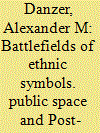

|
|
|
|
|
| Publication |
2009.
|
| Summary/Abstract |
This article provides an analysis of interdependencies between post-Soviet Erinnerungspolitik in public space and the individual perception of urban reconfigurations by ethnic Germans in Kazakhstan. Applying a qualitative social-geographic approach the author examines determinants of the process of ethnic symbolisation of real and imagined places. Individual biography and the extent of Soviet socialisation are factors shaping the personal perception of symbolic landscapes. From the perspective of the individual, space reflects the power distribution within society and hence, impacts on individual identity formation. Depending on the dominance of internal as opposed to external identification, the (perceived) changing ethnicised landscape of cities potentially fuels ethnic tension.
|
|
|
|
|
|
|
|
|
|
|
|
|
|
|
|
| 2 |
ID:
153710
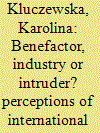

|
|
|
|
|
| Summary/Abstract |
Soon after the breakdown of the Soviet Union in 1991, a civil war started in Tajikistan (1992–97). This was also the period when a number of international organizations arrived in the country to distribute humanitarian assistance and assist in conflict resolution and stabilization. After the UN, the Organization for Security and Co-operation in Europe (OSCE) was the second key organization which appeared in the conflict-stricken country. Like other key international organizations in Tajikistan, the OSCE, which has been in the country since 1994, has seen a shift in its original functions of monitoring and emergency assistance. Some see its avowed objectives in the new century as formalistic, virtual and ineffective. By capturing perceptions of foreign assistance to Tajikistan among employees of the OSCE and other international organizations, NGO workers, government officials and ordinary citizens, this article explores how Tajikistan ‘socialized’ the OSCE, making the organization simultaneously a benefactor, an industry and even an intruder.
|
|
|
|
|
|
|
|
|
|
|
|
|
|
|
|
| 3 |
ID:
181820
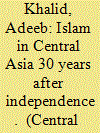

|
|
|
|
|
| Summary/Abstract |
The study of Islam in Central Asia has undergone enormous transformations in the 30 years since the Soviet era came to an end. Over the last three decades, a sizable corpus of literature on Islam in Central Asia has appeared across several disciplines. There has also been considerable debate over methods and approach: What questions are important to ask? Which kinds of sources are the most significant? Which voices from among Central Asians are the most important? This study has two main aims. First, it provides an overview of the various literatures on Islam in Central Asia, with a sense of their trajectories in the three decades since the dissolution of the Soviet Union. Second, and more importantly, it offers a critique of the critique mentioned above. The study does so by examining the ideological and methodological assumptions that underpin it and by articulating the stakes involved, a task that has not yet been undertaken.
|
|
|
|
|
|
|
|
|
|
|
|
|
|
|
|
| 4 |
ID:
181522
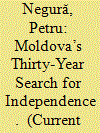

|
|
|
|
|
| Summary/Abstract |
Unlike in the Baltics, support for independence in Moldova was relatively low among the political elites and the general population when the Soviet Union collapsed. In the 1990s, the political parties in power pursued an incoherent program, as governments swung between reformist and conservative agendas. Economic crises and systemic corruption depleted citizens’ trust in politicians and state institutions. This low institutional trust has hampered governance at all levels, and primarily in crises such as the COVID-19 pandemic.
|
|
|
|
|
|
|
|
|
|
|
|
|
|
|
|
| 5 |
ID:
185189
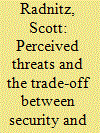

|
|
|
|
|
| Summary/Abstract |
It is well established that exposure to threats causes citizens to prioritize security considerations and accept restrictions on civil liberties. Yet most studies on which these findings are based come from longstanding democracies and do not distinguish among types of threat. This article argues that the effects of internal and external threats are conditional on regime type. It tests the argument via an experiment embedded in an original survey of Georgia and Kazakhstan, countries that vary in regime type but face similar levels of threat. In authoritarian Kazakhstan, there is no difference in attitudes by threat type, whereas external threats produce greater support for security than internal ones in more pluralistic Georgia. Contrary to previous research, security preferences are not mediated by the triggering of anxiety. The findings contribute to literatures on the link between threats and authoritarian preferences, the rally-round-the-flag effect, and the ways that political institutions mediate psychological processes.
|
|
|
|
|
|
|
|
|
|
|
|
|
|
|
|
| 6 |
ID:
151824
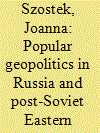

|
|
|
|
|
| Summary/Abstract |
Popular geopolitics refers to a subfield of Human Geography concerned with peoples’ perceptions of different parts of the world and how those perceptions are (re)produced in popular culture. It addresses how certain representations of international politics are embedded and promulgated in mass media, including cartoons, comics, movies, video games, newspapers and magazines. Audience engagements with geopolitical narratives in the media are part of this focus of study.
|
|
|
|
|
|
|
|
|
|
|
|
|
|
|
|
| 7 |
ID:
097908
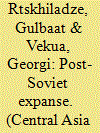

|
|
|
| 8 |
ID:
102183


|
|
|
| 9 |
ID:
134129
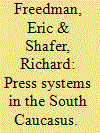

|
|
|
|
|
| Publication |
2014.
|
| Summary/Abstract |
This article examines the contemporary press environment and existing research on the press-including the role of new media in Armenia, Azerbaijan, and Georgia. In the early 1990s, these successor states emerged from the dismantled Soviet empire to form new governments, press systems, and other national institutions. Each was nominally committed to developing free enterprise-based economies and democratic governance. The article discusses the press after they became part of the U.S.S.R., critiques the three national press environments, and examines how rapid expansion of social media use is blurring traditional definitions of journalism. Last, it concludes that significant obstacles remain to development of functional, effective press systems that can maintain economic and political autonomy and plurality in the South Caucasus.
|
|
|
|
|
|
|
|
|
|
|
|
|
|
|
|
| 10 |
ID:
022997
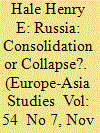

|
|
|
|
|
| Publication |
Nov 2002.
|
| Description |
1101-1125
|
|
|
|
|
|
|
|
|
|
|
|
|
|
|
|
| 11 |
ID:
106146


|
|
|
| 12 |
ID:
185920
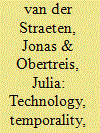

|
|
|
|
|
| Summary/Abstract |
This issue is dedicated to the question of how research on technology and its inherent temporality and materiality can enhance our understanding of geography, culture and history in Central Asia. The articles provide fresh ideas on Central Asia as a region by unpacking the “hard” infrastructural base of its cultural, social, and economic geography. They offer a more inclusive view on Central Asian landscapes, focusing on permanent material structures and vernacular practices that are often overlooked in conventional historiography and social studies research. Finally, they explore how research on technology both supports and challenges the primacy of political history in defining the historical periods and legacies of Central Asia. The papers cover about 150 years of history, with case studies on what are today Kazakhstan, Uzbekistan, Tajikistan, and Mongolia. This introductory essay summarizes their key insights, situating them in a wider debate on technology in and beyond Central Asia.
|
|
|
|
|
|
|
|
|
|
|
|
|
|
|
|
|
|
|
|
|